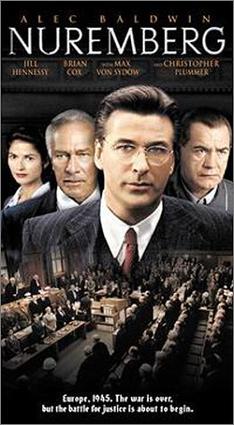Plot
Part one
At the close of World War II, Reichsmarschall Hermann Göring surrenders to the United States and enjoys the hospitality of a U.S. Army Air Force base. Samuel Rosenman, acting on the orders of U.S. President Harry S. Truman, recruits U.S. Supreme Court Justice Robert H. Jackson to prepare a war crimes tribunal against Göring and the surviving Nazi leadership. Göring, Albert Speer and others are arrested for war crimes and imprisoned in a U.S. Army stockade at Bad Mondorf in Luxembourg. Jackson, his assistant Elsie Douglas, and his prosecution team fly to Germany. Psychologist Gustave Gilbert arrives at the stockade with prisoner Hans Frank, who has attempted suicide.
Jackson negotiates with Allied representatives Sir David Maxwell-Fyfe, General Iona Nikitchenko and Henri Donnedieu de Vabres to ensure a unified prosecution. Jackson selects the Nuremberg Palace of Justice for the site of the trials and reconstruction work commences. Göring and the others are stripped of their rank and transferred to the prison in Nuremberg, where they come into conflict with the guards under the command of the strict Colonel Burton C. Andrus. Major Airey Neave serves Göring, Speer and the others with their indictments. U.S. judge Francis Biddle arrives to take control of the court but reluctantly passes the honour at Jackson's insistence. Following the suicide of prisoner Robert Ley, round-the-clock watches are posted and Gilbert is appointed prisoner liaison.
Sir Geoffrey Lawrence as presiding judge opens the trial with all defendants pleading not guilty, and Jackson gives a stirring opening statement. At lunch a jovial Göring holds court over the other defendants while Speer begins to show signs of remorse. Maxwell-Fyfe puts forward an emotive eyewitness account of the Nazis' genocidal policies toward Jews and others, while Jackson reads out dry documentation. As the court begins to tire of Jackson's meticulous approach, Maxwell-Fyfe urges pushing on to the witness interviews, which reveal the horrors of the concentration camps. The court is shaken by documentary footage of the camps; even Göring appears unsettled.
Part two
Speer explains Göring's dominance to Gilbert and insists that his control over the others must be broken. Göring takes the stand and begins using it to speak to the German people. Jackson, at Gilbert's suggestion, has Göring isolated. Under cross-examination, Göring outmaneuvers and humiliates Jackson, who later accuses Biddle of giving Göring free rein in court. Douglas talks Jackson out of tendering his resignation, and the two share a kiss. Under advice from Maxwell-Fyfe, Jackson returns to the courtroom to confront Göring with evidence of his crimes against the Jews and successfully dismisses the defendant’s denials.
At a Christmas party, the German housekeeper refuses to serve the Soviets, but Douglas rescues the situation before slipping away with Jackson. Gilbert visits the defendants and, under Jackson's advice, attempts to convince them to take responsibility for their crimes. Andrus relaxes the prison rules for Christmas, and Göring shares a friendly drink with his guard, Lt. Tex Wheelis. The cross-examination of the defendants intensifies and the defence calls Rudolf Höss, who casually reveals the horrors of Auschwitz. Speer is implicated in the enslavement of foreign workers by fellow defendant Fritz Sauckel and in response accepts collective responsibility for the crimes of the Nazi regime.
Gilbert interviews Göring's wife Emmy, who reveals that Hitler had ordered them all executed, which led to the family's surrender. Jackson is moved by Gilbert's summation of his examinations – that the source of the evil behind Nazi Germany was a complete lack of empathy – to give an impassioned closing statement. Göring uses his final statement to condemn the trial, and is sentenced along with several others to death by hanging. Speer uses his final statement to commend the tribunal and is sentenced to 20 years in prison. Göring commits suicide after his request to be executed by firing squad is denied. Andrus presides over the executions of the others while Jackson and Douglas head home.
Historical inaccuracies
In the film, Göring, his wife, and daughter drove and surrendered to an unnamed American air corps base in Germany on May 12, 1945. In reality, Göring, after sending an aide to Brigadier General Robert I. Stack in which he offered to surrender to Dwight D. Eisenhower personally, was discovered and arrested in a traffic jam near Radstadt by a detachment of the Seventh United States Army, which was sent through the German lines to find him and bring him to a secure American position, on May 6, 1945. [11]
Justice Jackson is portrayed as initially failing in his cross-examination of Gӧring and emerging triumphant on the second day. In reality, the cross-examination was a disaster and severely damaged Jackson's reputation. This situation was recovered by Maxwell Fyfe. [12]
When the defendants were indicted by Major Neave they all made oral statements. In reality, these statements were collected by Captain Gustave Gilbert. He asked the defendants to write their first reactions on a copy of the indictments. [13]
In the film, Albert Speer was arrested when he was giving a lecture to American soldiers. In reality, Speer was arrested together with Karl Dönitz and Alfred Jodl in Flensburg where they had set up a provisional government. [14]
In the film, Captain Gilbert is graciously given the right to talk to the prisoners by Col. Andrus in exchange for a library and an exercise field. In reality, Gilbert was specifically appointed to talk to the prisoners by the US military. The idea was that Andrus was to be informed by Gilbert about the state of mind of the prisoners. [15]
This page is based on this
Wikipedia article Text is available under the
CC BY-SA 4.0 license; additional terms may apply.
Images, videos and audio are available under their respective licenses.
